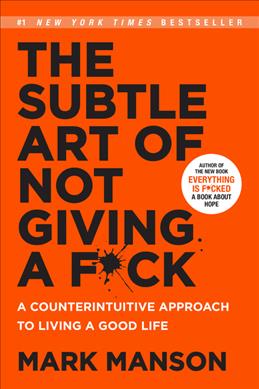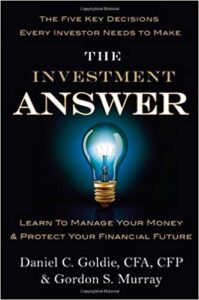
Review of The Subtle Art of Not Giving a F*ck
This book aims to show the reader to separate the important from the unimportant stuffs in life. This book will not teach you how to gain or achieve, but rather how to lose and let go. The “f*ck” here actually means attention.
Positivity = Negativity
Our culture today is obsessively focused on unrealistically positive expectations but all conventional life advice is actually fixating on what we lack. It lasers in on what you perceived your personal shortcomings and failures to already be, and then emphasises them for you.
If you are dreaming of something all the time, you are reinforcing the unconscious reality that you are not that. After all, no truly happy person feels the need to stand in front of a mirror and recite that he is happy.
The desire for more positive experience is itself a negative experience. And, paradoxically, the acceptance of one’s negative experience is itself a positive experience.
What to give a f*ck
Most people struggle throughout lives by giving too much f*cks in situations where f*cks do not deserve to be given. There is no such thing as not giving a f*ck. You must give a f*ck about something . Humans are biologically wired to always care about something and therefore to always give a f*ck.
Life is about overcoming negative experiences. The true measurement of self-worth is how one feels about negative experiences, rather than own positive experiences. The point is to find the shit that you enjoy dealing with.
Negative emotions are a call to action and when we feel them, it is because we are supposed to do something. Positive emotions are rewards for taking the proper action.
The 3 subtleties
1. Not giving a f*ck does not mean being indifferent; it means being comfortable with being different.
2. To not give a f*ck about adversity, you must first give a f*ck about something more important than adversity.
3. Whether you realise it or not, you are always choosing what to give a f*ck about.
Suffering
Practical enlightenment is being comfortable with the idea that some suffering is always inevitable – life is comprised of failures, loss, regrets, and even death. Suffering is nature’s preferred agent for inspiring change.
As with being rich, there is no value in suffering when it is done without purpose. Dissatisfaction and unease are inherent parts of human nature and necessary components to creating consistent happiness.
Our most radical changes in perspective often happen at the tail end of our worst moments. We need some sort of existential crisis to take an objective look at how we have been deriving meaning in our life, and then consider changing course.
Life and problems
Life is essentially an endless series of problems. The solution to one problem is merely the creation of the next one. Problems never stop; they merely get exchange and/or upgraded.
The first step towards solving problems is to realise that you and your problems are not privileged in their severity or pain. The only way to overcome pain is to first learn how to bear it.
Happiness
Whatever makes us happy today will no longer make us happy tomorrow because our biology always needs something more. We are wired to become dissatisfied with whatever we have and satisfied only by what we do not have.
Happiness comes from solving problems. True happiness comes from finding the problems you enjoy having and enjoy solving. What is the pain that you want to sustain? The answer will lead you to find true happiness.
Pleasure is not the cause of happiness but the effect. If you get the other stuff right (the other values and metrics), pleasure will naturally occur as a by-product. Pleasure and success will emerge once you nail down some good values and metrics.
In a relationship, when our highest priority is to always make ourselves feel good, or to always make our partners feel good, then nobody ends up feeling good. And our relationship falls apart without our even knowing it
Choosing values
Since suffering is inescapable, and our problems in life are unavoidable, the question we should be asking is not “How do I stop suffering?” but “Why am I suffering – for what purpose?” How you come to see your situation, how you choose to measure and value it is far more important than what is objectively true about your situation. We get to control what our problems mean based on how we choose to think about them, the standard by which we choose to measure them.
Good, healthy values are achieved internally. Values are about prioritisation. Shitty values involve tangible external goals outside of our control. Better values are process-oriented.
5 values that the author finds most beneficial:
1. Responsibility – taking responsibility for everything that occurs in your life, regardless of who is at fault;
2. Uncertainty – acknowledging your own ignorance and cultivation of constant doubt in your own beliefs;
3. Failure – the willingness to discover your own flaws and mistakes so that they may be improved;
4. Rejection – the ability to both say and hear no, clearly defining what you will and will not accept in your life;
5. Contemplation of one’s own mortality – paying attention to one’s own death is the only thing capable of helping us keep all other values in proper perspective. Confronting the reality of our own mortality obliterates all the crappy, fragile, superficial values in life.
Responsibility
The difference between a problem being painful or being powerful often is a sense that we chose it, and that we are responsible for it. We are always choosing, whether we recognise it or not. To simply blame others is only to hurt yourself.
The only way to solve our problems is first to admit that our actions and beliefs up to this point have been wrong and are not working. This openness to being wrong must exist for any real change or growth to take place.
Failure
Failure is a relative concept – it depends on what you are comparing with. Improvement at anything is based on thousands of failures, and the magnitude of your success is based on how many times you have failed at something.
We can be truly successful only at something we are willing to fail at. Otherwise, we are unwilling to succeed. People who become great at something become great because they understand that they’re not already great – they are mediocre, they are average – and that they could be so much better.
Rejection
Freedom grants the opportunity for greater meaning, but on its own, there is nothing necessarily meaningful about it. The only way to achieve meaning and a sense of importance in one’s life is through a rejection of alternatives, a narrowing of freedom, a choice of commitment to one place, one belief, or one person.
The rejection of alternatives liberates us – rejection of what does not align with our most important values, with our chosen metrics, rejection of the constant pursuit of breadth without depth. Breadth of experience is likely necessary and desirable when you are young – after all, you have to go out there and discover what seems worth investing yourself in. But depth is where the gold is buried. You have to stay committed to something and go deep to dig it up.
Conclusion
The premise of this book is learning how to focus and prioritise your thoughts effectively – essentially how to pick and choose what matters to you and what does not matter based on finely honed personal values. This is perhaps the only struggle in one’s life and takes a lifetime of practice and discipline to achieve. When you give too many f*cks, you will feel that you are perpetually entitled to be comfortable and happy at all times, that everything is supposed to be just exactly the way you want it to be. And this is impossible.
The author uses stories and real people to illustrate his points. Most people need to experience firsthand before learning the lessons, including the author. Nonetheless, if we are able to learn the lessons vicariously, we will be able to avoid most craps in life and live a happy life. The key to a good life is not giving a f*ck about more; it is giving a f*ck about less, giving a f*ck about only what is true and immediate and important. You cannot be an important and life-changing presence for some people without also being a joke and an embarrassment to others. We have to remember that everyone cannot be the best, else everyone is the same.
One-sentence summary for The Subtle Art of Not Giving a Fuck
Find some good values and metrics and only care about what really matters in your life.
Quotes
- The greatest truths in life are usually the most unpleasant to hear.
- Who you are is defined by what you’re willing to struggle for.
- Nobody else is ever responsible for your situation but you.
- Life is about not knowing and then doing something anyway.
- Without conflict, there can be no trust.
Rating
⭐⭐⭐
Interested in The Subtle Art of Not Giving a Fuck?
You may get the book from through the links below*.
Get the print book from Shopee Malaysia here
Get the ebook from Shopee Malaysia here
*These are affiliate links and I might earn a small amount if you purchase the book through the links.


